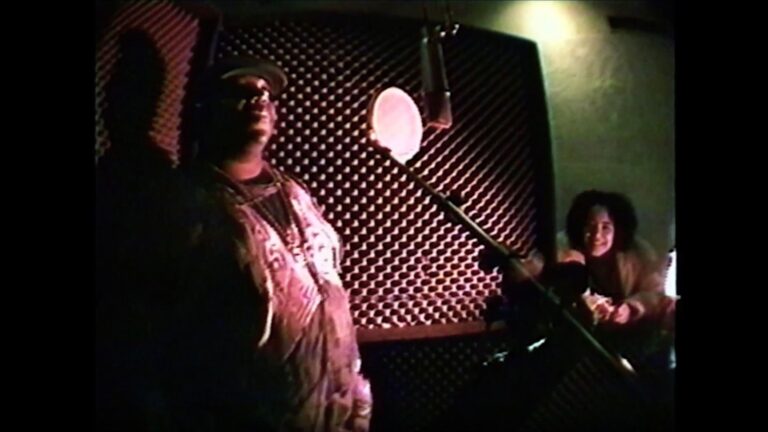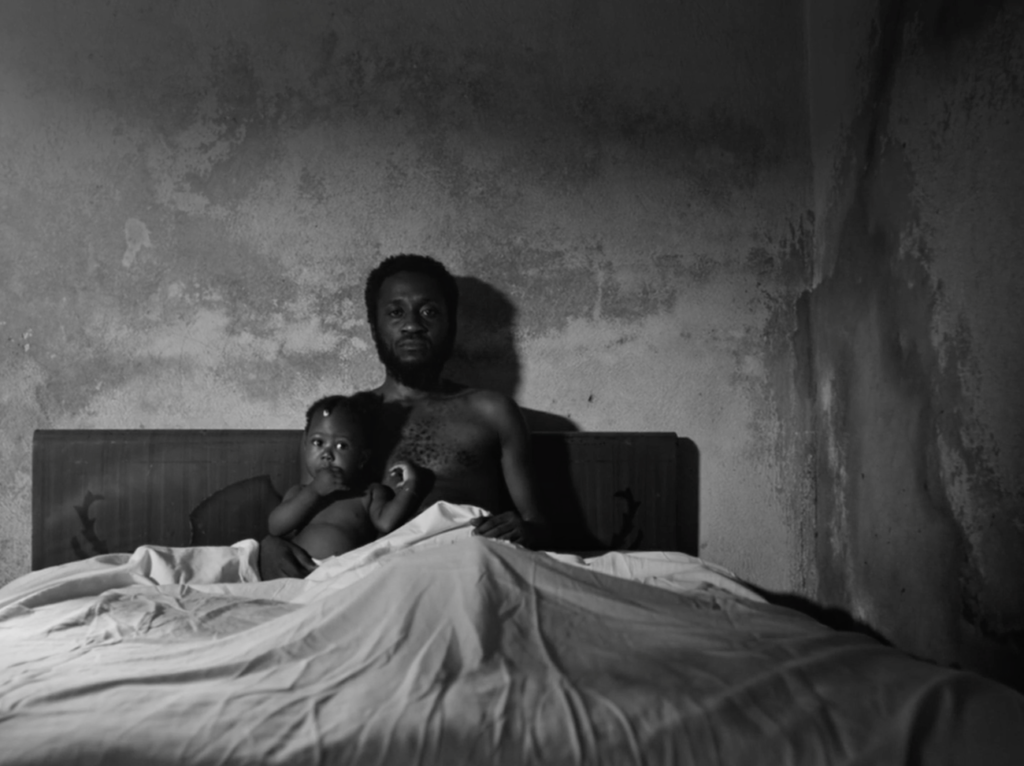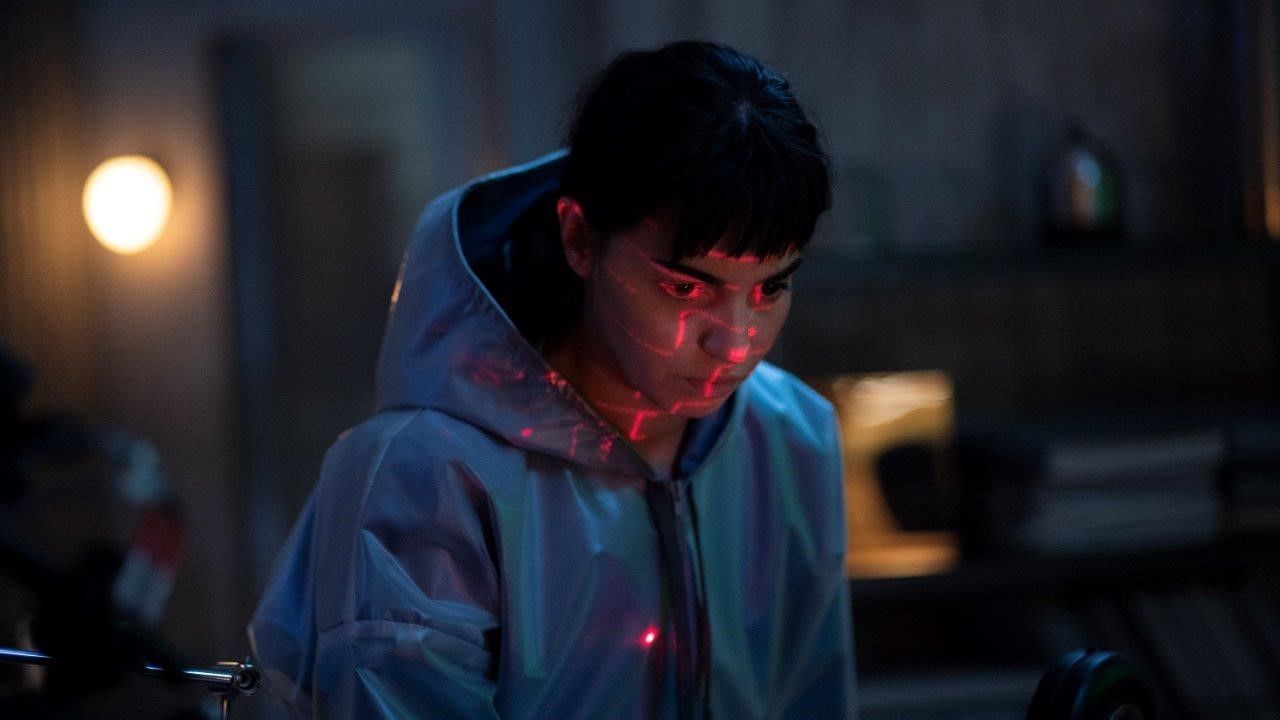
I’ve never felt prouder to be a Chicagoan than when attending the 30th Black Harvest Film Festival. As Chicago’s premier Black film festival, Black Harvest serves as a homecoming for the voices and stories of Black people from the city and across the diaspora and the world. This year, I felt a profound connection to my community and to others who share my identity around the globe. In the Western world, international film markets often exclude African and Caribbean countries from the conversation. Yet, these nations have powerful voices and important stories to tell—stories that frequently resonate with the experiences of Black Americans. Themes such as government corruption, police brutality, migration, and the daily struggle for survival are universally shared. No film captured these themes more than “Disco Afrika,” the stunning directorial debut from Madagascar filmmaker Luck Razanajaona.
The film follows Kwame (Delanoël Parista Sambo), a young man who returns home after enduring hardship in the clandestine sapphire mines only to face the pervasive corruption in his homeland. Razanajaona delivers a bold and unflinching political narrative, immersing the audience in a world riddled with systemic injustice. The central question posed is both haunting and compelling: “What can you do when there’s nothing you can do, but doing nothing isn’t an option?” It’s a dilemma Kwame must confront as he is torn between pursuing wealth and committing to political revolution.
Sambo’s performance is outstanding, infusing Kwame with youthful innocence and moral depth. The character’s internal conflict is palpable, as his humanity shines through in every moment of indecision. Kwame’s choices are shaped by the opposing influences of Bezara, a revolutionary mentor, and Idi, a childhood friend focused solely on self-preservation. In this narrative, there are no clear heroes or villains, only survivors. Sambo’s expressive, soulful eyes convey the character’s struggle, making his journey deeply affecting.
Beyond its compelling story, the film is a visual delight. Cinematographer Raphaël O’Byrne captures Black skin with unparalleled beauty, reminiscent of Ava Berkofsky’s groundbreaking work on HBO’s “Insecure”. The richness and vibrancy of the skin tones are complemented by the film’s striking costuming and set design, creating a visual feast.
Equally impressive is the film’s soundtrack, which, true to the title, plays a pivotal role in the storytelling. Music becomes a driving force in Kwame’s evolution, with each key moment marked by a musical cue that provides insight into his thoughts. One memorable scene shows Kwame discovering his late father’s music—a moment that sparks his awakening and compels him to challenge the world around him.
“Disco Afrika” is an incredible watch, seamlessly blending compelling storytelling with breathtaking visuals and a resonant soundtrack. It’s a film that lingers in your mind long after the final credits fade, leaving you eager to see what Razanajaona will create next.

Speaking of phenomenal soundtracks, music serves as a bridge between cultures. As the credits of “Disco Afrika” concluded, the rumblings of famed music journalist and director Dream Hampton’s latest documentary, “It Was All a Dream” signaled the start of another masterpiece.
Spanning the years 1993 to 1995, the film chronicles the early careers of ’90s hip-hop icons such as Notorious B.I.G., Method Man, Snoop Dogg, and many others. Much like Coodie’s “Jeen-yuhs” trilogy, Hampton’s work peels back the glossy veneer of fame to reveal the humanity behind the music.
The narrative unfolds through the eyes of a college-aged Hampton, who originally captured these moments for her NYU documentary class. Now, three decades later, the footage serves as a time capsule of an era that defined a generation. Hampton’s ability to humanize these burgeoning legends lies in her approach—not as a trailblazing music journalist but as a friend. We see intimate, unscripted moments: Hampton and Biggie sharing hearty laughs, Snoop Dogg expressing vulnerability and surprise at his rapid rise, and Lil’ Kim and Hampton bonding like sisters on a Brooklyn street.
Hampton’s deep connection to this community allows viewers to witness a side of these artists rarely seen. The warmth and authenticity she captures are rarely found in documentaries about music artists. It’s one thing to hear stories about icons; it’s another to watch them live, laugh, and love. Hampton portrays the men of the ’90s like Snoop Dogg—pioneers of gangsta rap—glowing with a vulnerability that media narratives of the time often ignored. In Snoop’s case, we glimpse the seeds of the warm, approachable personality he embodies today.
However, this isn’t just a film about the men of hip-hop; it’s also a tribute to the powerful women who helped shape the genre like Nikki D, LeShaun, and Hurricane G. Hampton doesn’t shy away from addressing the sexism and misogyny that have plagued the male-dominated music industry. Instead, she leans into this dynamic, amplifying the voices of women who often went unheard. This dichotomy adds depth, underscoring the durability and influence of female artists who paved the way for future generations.
Hampton’s ability to capture the essence of her subjects underscores the critical importance of Black people controlling their own narratives. Though the film takes place before the violent escalation of the East Coast–West Coast rivalry, it serves as a reminder of the joy and artistry that defined the music of the time. These were young men and women striving to create something extraordinary in an unforgiving world. “It Was All a Dream” honors their spirit, celebrating not only their music but also their humanity and determination to make something out of nothing.

For me, both “Disco Afrika” and “It Was All a Dream” served as powerful reminders of the enduring solidarity shared among Black communities as we navigate the challenges of our environments. Yet, despite the adversity portrayed, these films carried an undercurrent of hope. In contrast, the shorts winner, “Dreams Like Paper Boats,” directed and produced by Haitian filmmaker Samuel Frantz Suffren, shattered my heart.
The film follows Edouard (Kenny Laguerre), a father struggling to care for his daughter, Zazou, while they cling to an old cassette tape recorded by his love who has since immigrated abroad. Suffren’s decision to shoot in black and white feels intentional, as if the once-vivid community has lost its vibrancy now that Edouard and Zazou are left behind. It’s as though the absence of color mirrors the void in their hearts, asking the question: “What does love look like when it’s not within reach? When you are forced to leave it behind?”
There’s a profound grief in absence, akin to the pain of loss. Kenny Laguerre delivers an exceptional performance, conveying the emptiness in Edouard’s life through his expressive eyes. When interacting with Zazou, we see a faint spark of life, but in her absence, he withdraws into a cycle of sadness, anger, and eventual resignation. Edouard is a man burdened by defeat, and Laguerre captures this with great nuance.
Although the mother’s journey to the United States is never shown, her recorded message on the cassette hints at the difficulty of her decision to leave. The film underscores the bittersweet reality that even when we make sacrifices to improve the lives of those we love, we may still leave them behind.
Suffren masterfully blends realism with surrealist elements to craft a deeply affecting narrative. Edouard’s daydreams of his absent wife offer fleeting escapes from the chaos around him, creating a hauntingly beautiful juxtaposition between hope and despair.
“Dreams Like Paper Boats” is a story that feels incomplete, in the best way. Its emotional depth and layered storytelling deserve a larger canvas, and I sincerely hope Suffren expands this short into a feature-length film. It’s a story the world needs to see.


